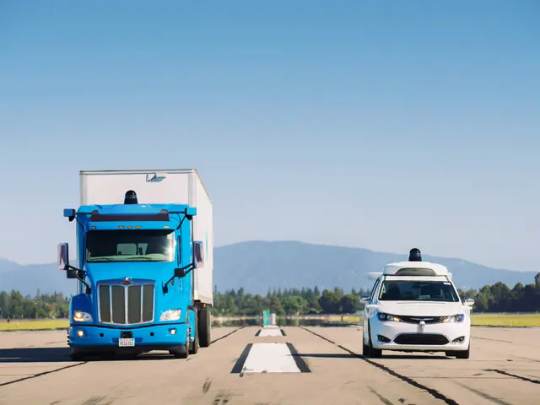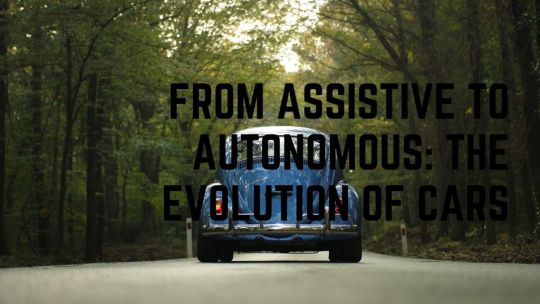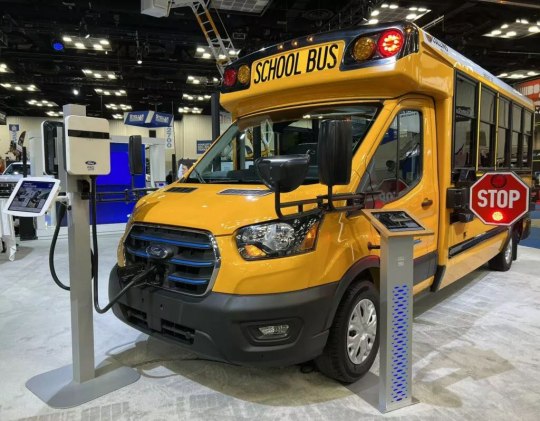#DriverlessCars
Text
Would you want a ride in a driver-less car?
Share your thought with us! #
Uber, Waymo to debut driverless cars in Atlanta in 2025
0 notes
Text
#AutonomousVehicles#SelfDrivingCars#VehicleControlSystems#AIinAutomotive#AutonomousDriving#SmartVehicles#AutomotiveTechnology#DriverlessCars#FutureOfTransportation#ADAS#TechInnovation#AutonomousSystems#MobilityTech#ConnectedVehicles#SmartTransportation#VehicleSafety#AutomotiveAI#TransportTech#AutomotiveTrends#AutonomousFuture
0 notes
Text
#futuretechnology#automotiveinnovation#smartcars#autonomousdriving#connectedvehicles#mobilitysolutions#electricvehicles#innovativetechnology#driverlesscars#futuristicdesign#sustainabletransportation#digitaltransformation#emergingtechnology#mobilitytrends#autotech#nextgenerationvehicles#cuttingedgetechnology#smartmobility#futureofdriving#disruptivetechnology#mobilityrevolution#advancedmobility#autonomousmobility#futureoftransportation#innovativecars#mobilityinnovation#futureofmobility#autonomousfuture#smarttransportation#futureofdrivingexperience
0 notes
Text
Self-Driving Cars and Trucks Market: Navigating the Future of Autonomous Vehicles

Introduction:
According to the study by Next Move Strategy Consulting, the Self-Driving Cars and Trucks Market size is predicted to reach USD 2.62 billion by 2030 with a CAGR of 11.7% by 2030.
In recent years, the concept of self-driving cars and trucks has shifted from the landscape of science fiction to a tangible reality, reshaping the landscape of transportation as we know it. With advancements in artificial intelligence (AI), sensor technology, and connectivity, autonomous vehicles have emerged as a transformative force, promising to revolutionize how we move people and goods from one place to another.
This article explores the burgeoning self-driving cars and trucks market, delving into the technological innovations, market dynamics, regulatory challenges, and societal implications that shape the future of autonomous vehicles.
Request a FREE sample, here: https://www.nextmsc.com/self-driving-cars-and-trucks-market/request-sample
Technological Advancements Driving the Self-Driving Cars and Trucks Market:
The rapid evolution of technology lies at the heart of the self-driving cars and trucks market. At the core of autonomous vehicles are sophisticated AI algorithms that enable them to perceive and interpret their surroundings, make decisions in real-time, and navigate complex environments with precision and efficiency.
One of the key technologies driving the advancement of self-driving cars and trucks is LiDAR (Light Detection and Ranging). LiDAR sensors emit laser pulses to measure distances to objects, creating high-resolution 3D maps of the vehicle's surroundings. Combined with radar, cameras, and GPS, LiDAR enables autonomous vehicles to detect and track other vehicles, pedestrians, and obstacles, allowing them to safely navigate roads and highways.
Furthermore, advancements in machine learning and deep learning algorithms have enhanced the capabilities of autonomous vehicles to recognize and respond to dynamic traffic scenarios. By continuously analyzing vast amounts of data collected from sensors and cameras, self-driving cars and trucks can adapt to changing road conditions, anticipate potential hazards, and make split-second decisions to ensure the safety of passengers and pedestrians.
Market Dynamics and Growth Prospects:
The self-driving cars and trucks market is characterized by rapid innovation, intense competition, and shifting consumer preferences. Major automotive manufacturers, technology firms, and startups are vying for market share, investing billions of dollars in research and development to bring autonomous vehicles to market.
Inquire before buying, here: https://www.nextmsc.com/self-driving-cars-and-trucks-market/inquire-before-buying
One of the primary drivers of growth in the self-driving cars and trucks market is the demand for safer, more efficient transportation solutions. With traditional vehicles plagued by human error, which is a leading cause of accidents on the road, autonomous vehicles offer the promise of significantly reducing the risk of collisions and fatalities. As a result, consumers, fleet operators, and policymakers are increasingly embracing autonomous technology as a means to enhance road safety and improve traffic flow.
Moreover, the potential economic benefits of self-driving cars and trucks are driving widespread adoption across various industries. In the logistics sector, autonomous trucks hold the promise of reducing transportation costs, optimizing delivery routes, and increasing the efficiency of supply chains. Similarly, in the ride-sharing and mobility-as-a-service (MaaS) industry, autonomous vehicles offer the potential to lower operating expenses, improve vehicle utilization rates, and enhance the overall customer experience.
However, despite the immense potential of the self-driving cars and trucks market, several challenges and barriers to adoption remain. Chief among these is the regulatory landscape, which varies significantly from one jurisdiction to another. While some countries and regions have embraced autonomous technology with open arms, others have adopted a more cautious approach, implementing stringent regulations and testing requirements to ensure the safety and reliability of autonomous vehicles.
Furthermore, ethical considerations surrounding autonomous vehicles, such as liability in the event of accidents and the moral implications of algorithmic decision-making, pose complex challenges that must be addressed. Additionally, concerns about data privacy and cybersecurity loom large, as autonomous vehicles rely heavily on interconnected systems and communication networks, raising the specter of potential cyber threats and vulnerabilities.
Societal Implications and Ethical Considerations:
The widespread adoption of self-driving cars and trucks is poised to have far-reaching societal implications, reshaping how we live, work, and interact with our environment. On the one hand, autonomous vehicles hold the promise of greater mobility and accessibility for individuals with disabilities, elderly populations, and underserved communities, enabling them to access essential services and participate more fully in society.
On the other hand, the rise of autonomous vehicles raises questions about the future of employment, as millions of workers employed in transportation-related industries face the prospect of job displacement. Truck drivers, taxi drivers, and delivery personnel are among those most at risk of automation, prompting concerns about unemployment, income inequality, and the need for workforce retraining and reskilling programs.
Moreover, the ethical considerations surrounding autonomous vehicles are complex and multifaceted, touching on issues of human dignity, justice, and accountability. In the event of an unavoidable accident, how should self-driving cars prioritize the safety of passengers versus pedestrians? Who should bear responsibility for accidents caused by autonomous vehicles: the manufacturer, the software developer, or the vehicle owner?
These are just a few of the ethical dilemmas that policymakers, ethicists, and technologists grapple with as autonomous technology continues to advance. As autonomous vehicles become increasingly integrated into our daily lives, it is imperative that we address these ethical concerns thoughtfully and proactively, ensuring that the benefits of autonomous technology are equitably distributed and that the rights and interests of all stakeholders are safeguarded.
Conclusion:
In conclusion, the self-driving cars and trucks market represents a paradigm shift in transportation, ushering in a new era of mobility that promises to enhance safety, efficiency, and accessibility for individuals and businesses around the world. With advancements in technology driving rapid innovation and growth, the future of autonomous vehicles is brimming with potential.
However, realizing this vision requires navigating a complex landscape of technological, regulatory, and ethical challenges. By collaborating across industries, disciplines, and borders, stakeholders can work together to address these challenges, ensuring that autonomous vehicles fulfill their promise of a safer, smarter, and more sustainable future for all.
As we navigate the future of autonomous vehicles, let us seize the opportunity to shape a transportation system that reflects our values, priorities, and aspirations. By harnessing the power of innovation and collective action, we can build a world where self-driving cars and trucks pave the way towards a brighter, more inclusive future for generations to come.
#SelfDrivingCars#AutonomousVehicles#DriverlessCars#SelfDrivingTrucks#FutureOfTransport#SmartMobility#AutomotiveandTransportation#MarketTrends#IndustryAnalysis
0 notes
Text
Tyson Foods Takes A First Step Into Driverless Cars With Gatik
#autonomousvehicles #driverlesscars #Google #tysonfoods #Walmart
0 notes
Text
Could Cruise be the Theranos of AI? And is there a dark secret at the core of the entire driverless car industry?
Even if the human input is used to generate more training data, this is absolutely nuts.
1 note
·
View note
Text
0 notes
Text
Google's Driverless Cars Are Finally Coming to San Francisco
#cars #driverlesscars #Google #SanFrancisco #technology
0 notes
Text
From Assistive to Autonomous: The Evolution of Cars
The invention of the automobile was a landmark moment that transformed the way we travel and connect with the world. Over the decades, cars have come a long way, evolving from basic assistive vehicles to sophisticated autonomous machines. This article delves into the captivating journey of cars, tracing the advancements in technology that have paved the path from assistive driving to the promise…

View On WordPress
#AI#AIAutomobiles#AIinCars#AutoAI#AutomaticDriving#AutomaticVehicles#AutonomicVehicle#AutonomousCars#AutonomousVehicles#Autonomy#AutoRevolution#AutoTech#Cars#DriverlessCars#DriverlessVehicles#FutureOfDriving#MachineLearning#MLinAutomobiles#RoboCars#SelfDriving#SmartAutomation#SmartCars#SmartDriving
0 notes
Text
Volkswagen Self Driving Car
#volkswagen#selfdrivingcars#us#autonomousvehicles#testing#technology#innovation#futureoftransportation#smartmobility#automotiveindustry#artificialintelligence#safety#electricvehicles#driverlesscars#transportationrevolution
0 notes
Text

الكل على متن أول حافلة مدرسية ترانزيت كهربائية بالكامل من فورد E-Transit Van
#electric car#self-driving cars#technology#smartcity#emobility cars mobility robot driverlesscars robotics ai guidaautonoma autonomous electricvehicles
7 notes
·
View notes
Video
youtube
"Revolutionizing Transportation: Meet Cruise Origin, Japan's Self-Drivin...
#youtube#CruiseOrigin SelfDrivingTaxis InnovationInMobility GM Honda Cruise FutureOfTransportation DriverlessCars TechNews TransportationRevolution T
0 notes
Text
0 notes
Text
Navigating Ethical Dilemmas in Autonomous Vehicles
🚗💡 The Moral Responsibilities of Driverless Cars in Modern Society 💡🚗
As we stand on the brink of a technological revolution with the advent of driverless cars, it's crucial to consider the ethical implications these autonomous vehicles bring to our society.
#Moral_Responsibilities_of_Driverless_Cars_in_Modern_Society
#MoralResponsibilitiesOfDriverlessCarsInModernSociety
#DriverlessCarsEthics
#AutomatedVehiclesResponsibilities
#EthicsInAutonomousDriving
Imagine a world where decisions are made not just by humans but by algorithms. Who is responsible when a driverless car encounters an unavoidable accident? How do we program these vehicles to prioritize lives in critical situations? 🤔
Navigating the moral landscape surrounding autonomous driving isn't just about technology—it's about our values, ethics, and the future we envision. As we push forward, we must engage in rigorous debates and established frameworks that guide the deployment of AI in transportation.
Let's work together to ensure that technology serves humanity responsibly and ethically.
What are your thoughts on the moral responsibilities of driverless cars?
#DriverlessCars #AutonomousVehicles #EthicsInTech #AI #Transportation #FutureOfMobility #TechnologyAndSociety #MoralResponsibility #Innovation #SmartTransportation #EthicalAI #SustainableMobility
0 notes
Text
Tyson Foods Takes A First Step Into Driverless Cars With Gatik
#autonomousvehicles #driverlesscars #Google #tysonfoods #Walmart
0 notes